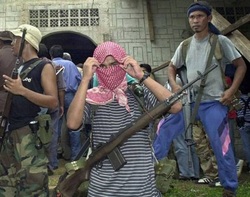South Asia Terrorist Group - Abu Sayyaf

Abu Sayyaf Group (ASG)
Description
The ASG is primarily a small, violent Muslim terrorist group operating in the southern Philippines. Some ASG leaders allegedly fought in Afghanistan during the Soviet war and are students and proponents of radical Islamic teachings. The group split from the much larger Moro National Liberation Front in the early 1990s under the leadership of Abdurajak Abubakar Janjalani, who was killed in a clash with Philippine police in December 1998. His younger brother, Khadaffy Janjalani, replaced him as the nominal leader of the group and appears to have consolidated power.
Activities
The ASG engages in kidnappings for ransom, bombings, beheadings, assassinations, and extortion. The group’s
stated goal is to promote an independent Islamic state in western Mindanao and the Sulu Archipelago (areas in the
southern Philippines heavily populated by Muslims) but the ASG has primarily used terror for financial profit. Recent
bombings may herald a return to a more radical, politicized agenda, at least among certain factions. The group’s first large-scale action was a raid on the town of Ipil in Mindanao in April 1995. In April of 2000, an ASG
faction kidnapped 21 persons, including 10 Western tourists, from a resort in Malaysia. On May 27, 2001, the ASG kidnapped three US citizens and 17 Filipinos from a tourist resort in Palawan, Philippines. Several of the hostages,
including US citizen Guillermo Sobero, were murdered. During a Philippine military hostage rescue operation on June 7, 2002, US hostage Gracia Burnham was rescued, but her husband Martin Burnham and Filipina Deborah Yap were killed. Philippine authorities say that the ASG had a role in the bombing near a Philippine military base in Zamboanga in October 2002 that killed a US serviceman. In February 2004, Khadaffy Janjalani’s faction bombed SuperFerry 14 in Manila Bay, killing approximately 132, and in March, Philippine authorities arrested an ASG cell whose bombing targets included the US Embassy in Manila.
Strength
Estimated to have 200 to 500 members.
Location/Area of Operation
The ASG was founded in Basilan Province and operates there and in the neighboring provinces of Sulu and Tawi-
Tawi in the Sulu Archipelago. The group also operates on the Zamboanga peninsula, and members occasionally
travel to Manila. In mid-2003, the group started operating in the major city of Cotobato and on the coast of Sultan
Kudarat on Mindanao. The group expanded its operational reach to Malaysia in 2000 when it abducted foreigners from a tourist resort.
External Aid
Largely self-financing through ransom and extortion; has received support from Islamic extremists in the Middle
East and may receive support from regional terrorist groups. Libya publicly paid millions of dollars for the release of the foreign hostages seized from Malaysia in 2000.
More information about this group
